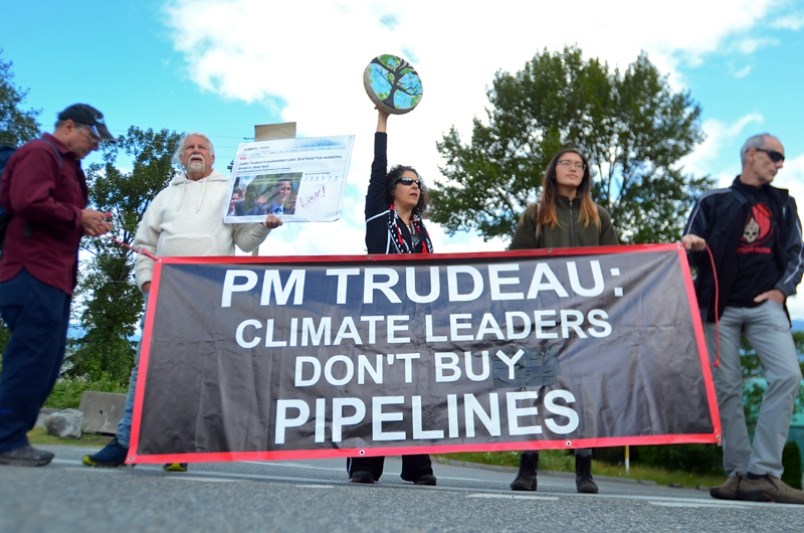A New Westminster teacher left the classroom behind in her quest to fight for the planet’s future.
Jennifer Nathan was teaching science at New Westminster Secondary School, until the climate crisis touched her heart so profoundly that she could no longer stay in a classroom. Last year, she took part in protests against the Kinder Morgan pipeline expansion.
“I was arrested nearly a year ago in March,” she told city council March 11. “From then till now, we have seen the world break records for heat waves and the deadliest and most destructive wild fires, the Lower Mainland’s worst air conditions, unprecedented droughts, extensive flooding, evacuations of millions of people, crop failures, two of the most destructive hurricanes in American history, shrinking Arctic ice.”
The New West resident was charged with criminal contempt of court after being arrested on March 24, 2018 for blocking access to the tank farm on Burnaby Mountain. She was one of several delegations at the March 11 council meeting urging the city to approve a motion on climate.
“You are telling generations, that in the face of all this fear and uncertainty, there is all this hope,” Nathan, a representative of New Westminster Climate Action Committee and a member of the Force of Nature Alliance, told council.
On Monday, council directed staff to report back on a number of items related to climate actions that could be taken by the City of New Westminster, such as updating existing city plans with new targets contained in the Intergovernmental Panel on Climate Change report, new actions the city could pursue to help achieve its targets and new actions that would help reduce greenhouse gas emissions. Councillors Jaimie McEvoy and Nadine Nakagawa brought forward the motion to have council recognize that climate change constitutes an emergency for the City of New Westminster.
Nakagawa said municipalities can’t wait for senior levels of government to take action to address the climate crisis.
“What really matters to me is a plan on how we are going to implement it. It is important to commit to the goals, but at the end of the day, the proof is in the budget, the proof is in the plan. We have to have a plan of how we will achieve it,” she said. “We can’t congratulate ourselves on making statements without the plan and staff energy to focus on meeting those targets.”
The resolution approved by council states that the Intergovernmental Panel on Climate Change finds it necessary to limit global warming to 1.5 degrees Celsius, rather than two degrees and previously understood. It said Earth is currently on track to warm by more than three degrees Celsius.
“The Intergovernmental Panel on Climate Change has stated that we only have 11 years left to turn this situation around. The climate crisis really has become the climate emergency,” McEvoy said. “We are affected whether we like it or not.”
According to the motion, the Intergovernmental Panel on Climate Change puts the benchmark for greenhouse gas reduction targets for corporate and community-wide emissions at 45 per cent by 2030, 65 per cent by 2040 and 100 per cent by 2050.
“The targets that are being recommended tonight are those that have been recommended by the international body and the scientific community. They are based on something real,” McEvoy said. “We deal with a lot of important issues – to deal with any one of them, we need to save the planet.”
Several environmentalists attended Monday’s council meeting in support of the motion about climate action.
“It’s really cities and city councils, mayors and councils, who can be heroes,” said Jake Hubley, a community organizer with Force of Nature Alliance. “They are the ones who can make huge changes right now in our cities to our emissions in buildings, to transportation, all these things.”
In a letter read to city council, New Westminster resident Kate Haberl said the time to address climate change is now.
“There is hope,” she wrote. “If we take the right path, if we recognize this existential threat for what it is and are brave enough to face it by declaring a state of emergency, reaching net zero carbon emissions in the next 15 years and negative carbon missions before the end of the century, we stand a chance. In order for me and the kids coming up after me to have a future, cities like New Westminster need to be taking action. We need to see governments pushing for greener policies within our communities.”
New Westminster city council also directed staff to include climate action for consideration within the city’s strategic plan, which is currently being developed.
Coun. Patrick Johnstone, an environmental scientist, said he doesn’t have to be convinced about climate change but was initially reluctant to declare a climate emergency at this time.
“This council is going through a strategic planning session for our new term, where we set out what our priorities are going to be for the next four years. I was kind of thinking about carts and horses – what do we do first?” he said. “It was actually Coun. Nakagawa who sort of gave my head a bit of a shake and talked to me about the need to declare this, to make a clear message that this informs all of our strategic planning, so when we do our strategic planning and do the next steps forward, we are doing it through a climate change lens.”
According to Force of Nature Alliance, New Westminster is the fourth Lower Mainland municipality to pass similar motions since the group launched a campaign last fall to urge municipalities to raise their climate targets and to become carbon neutral by 2050.
“This is New West showing climate leadership, and it goes to show people can get these wins in their communities,” Hubley said in a press release. “These targets are necessary to get us on a path of real action on the climate crisis.”



